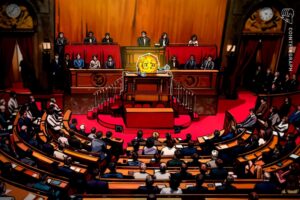Rachel Reeves Eyes £5bn Bitcoin Sale to Plug UK Financial Black Hole

Could Bitcoin Help Fund Labour’s Financial Plans? Chancellor Eyes £5 Billion from Seized Crypto
Introduction to Seized Cryptocurrency Assets
Rachel Reeves may have a unique opportunity to leverage over £5 billion in bitcoin confiscated from criminal organizations to support Labour’s financial initiatives. This potential funding source has emerged as the Home Office and law enforcement agencies prepare for a significant sale of seized cryptocurrencies, with the Treasury poised to benefit from the proceeds.
- Introduction to Seized Cryptocurrency Assets
- Plans for Regular Cryptocurrency Sales
- Chancellor Under Pressure Amid Tax Concerns
- Bitcoin’s Rising Value
- The Potential of Digital Assets
- Government’s Stance on Cryptocurrency Taxation
- Expected Revenue from New Regulations
- Reform UK’s Tax Proposals
- Current Tax Rates on Cryptocurrencies
- Conclusion
Plans for Regular Cryptocurrency Sales
Authorities are also working on establishing a systematic approach for the ongoing sale of confiscated digital currencies. This initiative aims to create a sustainable revenue stream from assets linked to organized crime.
Chancellor Under Pressure Amid Tax Concerns
As the Chancellor faces mounting pressure to avoid tax increases in the upcoming autumn budget, Labour backbenchers have thwarted attempts to reduce welfare costs and have diluted proposals to means-test winter fuel payments.
Bitcoin’s Rising Value
Recently, bitcoin reached a record high of £123,000, leading to reports that a stash of 61,000 bitcoins seized from a Chinese Ponzi scheme in 2018 could now be valued at over £5.4 billion—significantly more than its worth at the time of confiscation.
The Potential of Digital Assets
Aidan Larkin, CEO of Asset Reality, remarked on the untapped potential of digital assets, stating that there could be hundreds of millions of pounds flowing back into the UK from illicit sources.
Government’s Stance on Cryptocurrency Taxation
Ministers are increasingly recognizing cryptocurrencies as a viable income source. Recently, they announced plans to crack down on tax evasion by speculators in the crypto market. New regulations will impose fines of £300 on individuals who fail to provide personal information to cryptocurrency service providers, ensuring compliance with tax obligations.
Expected Revenue from New Regulations
The government anticipates that these new regulations, known as the Cryptoasset Reporting Framework, will generate up to £315 million by April 2030. Service providers that do not accurately report transactions and tax reference numbers will also face penalties.
Reform UK’s Tax Proposals
Reform UK has proposed reducing taxes on cryptocurrencies and establishing a ‘Bitcoin reserve’ if they come to power. Party chairman Zia Yusuf indicated that a Reform government would lower capital gains tax on cryptocurrencies to 10%, aiming to stimulate usage and attract more assets to the UK.
Current Tax Rates on Cryptocurrencies
At present, cryptocurrencies are subject to capital gains tax rates of either 18% or 24%, depending on the seller’s income tax bracket. Yusuf also suggested that his party would allow tax payments in bitcoin and create a ‘Bitcoin reserve fund’ to diversify the UK’s financial reserves.
Conclusion
As discussions around cryptocurrency and taxation evolve, the potential for seized digital assets to support Labour’s financial strategies presents a fascinating intersection of law enforcement, finance, and politics. The government’s approach to regulating and capitalizing on these assets could significantly impact the UK’s economic landscape.







